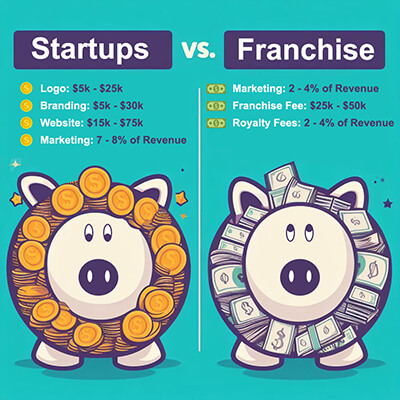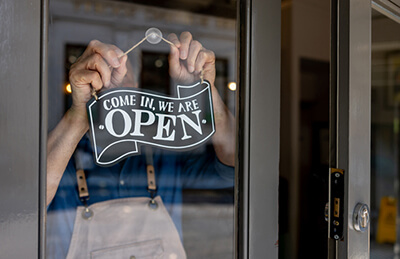Please Confirm
Are you sure you wish to REMOVE from your request basket?
At the crossroads of entrepreneurship, you'll find two compelling routes: building your own venture from the ground up or stepping into the proven framework of a franchise. This article dives into the worlds of each path, examining the financial commitments, operational intricacies, marketing efforts, risk factors, and time commitments you'll encounter on either journey.

Capital Requirements
Starting an independent business and buying a franchise both require similar financial investments, from initial setup to ongoing operational expenses. However, there are a few unique expenses for each. Click the Read More below to delve into the lesser-known financial intricacies of both options, uncovering hidden costs, fees, and other variables that could significantly impact your bottom line.
Business: Setting up an independent business entails diverse startup costs, including real estate, inventory, staffing, and licenses. But the financial landscape doesn't stop at launch; ongoing costs such as marketing, brand development, and customer acquisition are integral for long-term success.
Franchise: Acquiring a franchise involves an upfront franchise fee in addition to startup costs similar to an independent business, like equipment and building expenses. What sets franchises apart is the inclusion of value-added services, such as national marketing and brand recognition. Royalty fees are a key ongoing cost, often offsetting the need for further spending in areas like branding.
Costs Unique to Starting an Independent Business
Starting a business from scratch often requires a substantial financial investment, from legal fees to inventory. According to Shopify, “small-business owners spend an average of $40,000 in their first full year of business.” The financial dedication in the first year of business for independent entrepreneurs can frequently amount to an investment similar to or even exceeding the franchisee fee required for many franchise opportunities.
Financial responsibilities continue beyond the first year, including sustained marketing, technology updates, and business strategy adjustments.
Logo Costs
In the world of entrepreneurship, every detail matters—even the cost of a logo. When you're carving your own path, even seemingly small tasks like logo design can add up. Some business owners choose to take on these responsibilities themselves. This choice can be cost-effective but it comes at the expense of time, which may not always result in a professional-looking design.
“Independent designers and small agencies provide quality logos for reasonable rates of $1,000-$15,000 on average. Experienced specialists and firms with compelling portfolios cost more from $5,000-$25,000.” It's important to weigh the value of your time and the potential impact of your logo on your brand's perception when deciding between DIY logo design and professional services. In contrast, franchisees benefit from a professionally designed logo at no additional cost, saving them both time and financial capital.
Branding
In addition to the core branding elements, independent businesses may need to allocate additional resources for branding-related costs, such as a tagline, story, and further brand standards which are essential for establishing a strong brand identity. Agencies typically charge $5,000 to $30,000 for these services in total.
Website Design and Development
For an independent business, website design and development costs can be a significant expense, requiring a budget for not just the initial setup but also ongoing maintenance and updates to keep the site functional and appealing. While there are do it yourself options, “A simple custom website design from an agency can range from $15,000 to $30,000. Bigger and more complicated websites will cost between $40,000 to $75,000 or more.”
Marketing
In the world of independent business, marketing isn't a one-time event but an ongoing process. Unlike franchisees, who often benefit from the established brand of their franchisor, independent business owners must consistently invest in marketing to build brand awareness, attract new customers, and maintain a competitive edge.
This ongoing commitment can take many forms, from digital advertising and social media campaigns to public relations and community outreach efforts. It's not just about creating initial buzz; it's about sustaining that momentum through continuous engagement with your target audience.
Costs Unique to Buying a Franchise
Franchise Fee
The initial franchise fee can vary, with an average range of “$25,000 to $50,000.” The fee encompasses the costs of application and vetting, the license for utilizing the franchise's branding and operational systems, along with training services, national advertising, and other support to facilitate a smooth onboarding process for the new franchisee. While the upfront costs for a franchise may sometimes be higher, they often include a wide range of essential business services that would otherwise add to the costs of a startup, specifically the ones listed in the section above.
Royalty Fees
Franchises involve ongoing royalty payments. Franchisees pay these ongoing royalty fees to the franchisor, often averaging around 8% of total revenue. However, it's essential to note that additional fees, such as technology and marketing fees, can contribute to the total cost, potentially reaching up to 12% of revenue.
Control and Flexibility
Business: In an independent business, the owner has the latitude to make all operational decisions, from selecting suppliers to setting the hours of operation. This freedom comes with the responsibility of establishing all business processes from scratch, which can be time-consuming and risky.
Franchise: Operating a franchise offers the substantial benefit of a proven business model, complete with detailed operational guidelines, vetted supplier relationships, and often, an integrated point-of-sale system. These advantages go beyond simplifying startup—they dramatically reduce the time franchisees spend on sourcing, decision-making, and administrative tasks.
Staffing
In an independent business, the staffing landscape is yours to shape. You have the freedom to recruit talent based on unique skill sets, design your own training programs, and adjust staffing levels to meet market demands. This flexibility lets you fine-tune your workforce for optimal performance. However, the responsibility for hiring, training, and managing staff falls entirely on you, requiring a significant investment of time and resources.
In contrast, franchises come with the benefit of tried-and-true staffing solutions that are part of their established business models. These include pre-designed training programs and often, suggested hiring criteria. This not only removes the guesswork from assembling and training a team, but also frees up valuable time. The time saved can be strategically reinvested into enhancing customer experience or executing targeted marketing campaigns, thereby amplifying your operational effectiveness and revenue potential.
Product Offerings
Independent businesses enjoy the freedom to swiftly adjust and diversify their product offerings in response to market trends and customer preferences. Whether it's a restaurant introducing seasonal dishes or a retail store stocking new merchandise, they can quickly pivot and respond to evolving consumer demands.

In contrast, franchises operate within a standardized framework, often maintaining uniform product offerings across their locations to ensure brand consistency and uphold the franchise's reputation for quality and reliability. This uniformity in product offerings may appear to limit the flexibility of franchises, but it also comes with a significant advantage.
Franchises benefit from the substantial financial resources and marketing prowess of the franchisor, allowing them to allocate considerable budgets for product testing and research and development (R&D). In fact, these budgets for product testing and innovation in franchises can sometimes surpass the entire annual revenue of a potential startup. This financial backing significantly reduces the risk of product failures and enables franchises to conduct larger-scale marketing and product testing initiatives, ultimately contributing to a competitive edge and success in the market.
Business: In an independent business, the support network is often a solo endeavor, largely dependent on the owner's initiative to seek advice and mentorship. This path offers the freedom to choose your advisors but comes with the challenge of navigating the entrepreneurial journey largely on your own.
Franchise: Franchisors provide structured support through training programs, operational guidelines, and ongoing assistance. Moreover, franchisees often have the opportunity to connect with fellow franchisees within the same system, fostering collaboration and knowledge sharing. Leading franchises actively encourage such interactions, creating a supportive community.
Training
When starting an independent business, your need for training largely depends on your existing knowledge and experience. If you're well-versed in all aspects of the industry and business operations, you may not require formal training. However, for many independent entrepreneurs, there are often areas where additional expertise is needed. In such cases, investing in external training or seeking guidance can be necessary, incurring additional costs.
On the other hand, franchises typically offer comprehensive training programs for their franchisees. Regardless of your background, the franchisor provides structured training that covers all facets of running the business. This comprehensive training ensures that franchisees are well-prepared to manage the franchise effectively, even if they are entering a new industry or taking on a new role. The training and support provided by franchises can be a significant advantage, especially for individuals with limited prior experience in the specific business sector.
Purchasing Power
When you start a business from scratch, you're often negotiating with suppliers on your own, which may not give you much leverage for discounts or favorable terms. In the franchise world, you're part of a larger network, allowing you to leverage economies of scale through the franchisor's bulk purchasing power.
“One obvious advantage that big businesses have over small businesses is their access to increased buying power. The franchise may buy large amounts of inventory and equipment on behalf of their franchisees, meaning you’ll obtain these important assets at a reduced cost.” This can result in significant cost savings on supplies, inventory, and even services like advertising.
Technology
In an independent business, technology choices are yours to make, but they come with the responsibility of implementation and maintenance. In contrast, franchises often provide integrated technology platforms, such as point-of-sale and inventory management systems, supported by the franchisor. While convenient, this can limit customization based on specific needs or market conditions.
Business: Marketing in an independent business is an evolving puzzle, requiring constant adaptation to consumer behavior and market trends. The challenge lies not just in gaining visibility, but also in sustaining it through creative campaigns.
Franchise: In a franchise, your marketing efforts are amplified by the brand's existing reach, giving you a head start in consumer trust. The key is to leverage this brand equity effectively within the parameters set by the franchisor.
Marketing
In an independent business, you have the freedom to craft your own brand image, target specific customer segments, and employ a variety of marketing channels. However, this freedom comes with the responsibility of developing and executing your own marketing strategies, which can be time-consuming and costly. “Marketing experts and agencies often recommend that small businesses spend anywhere from 7-8 percent of their gross revenue on marketing. And, according to a study, small businesses tend to follow this rule, spending around 3-5 percent.”
In a franchise system, the marketing landscape is generally more structured and supported by the franchisor. Franchisees often benefit from national advertising campaigns, brand recognition, and established marketing materials like banners, online ads, and promotional items. Additionally, it's common for franchise agreements to include a marketing fee, typically ranging between 2-4% of gross revenue. This marketing approach can alleviate some of the responsibilities for individual franchisees, but may entail less control over specific marketing decisions.
Social Media Presence

In today's digital age, a robust social media presence isn't just a nice-to-have; it's a must. Building and maintaining a strong social media profile is about more than just occasional posts. It involves a multi-faceted strategy that includes:
Content Creation: From blog posts and articles to videos and infographics, generating high-quality content is essential for keeping your audience engaged.
Graphic Design: Visuals play a huge role in social media, from profile pictures and cover photos to post images and story graphics. “Agencies, on average, charge $50 per hour for junior designers. Seniority raises the price as senior designers cost between $75 and $150 an hour. Note that established agencies may charge significantly more.”
Influencer Collaborations: “The average cost for a sponsored TikTok is $3,514. That’s the second highest after YouTube which averages $4,491 per video. As a baseline, the industry standard is $100 per 10,000 followers.”
Managing all these elements can be a full-time job in itself, requiring a dedicated team or agency. The time invested in strategizing, creating, posting, and analyzing can be immense. “The average small business spends anywhere from $200 to over $2,000 per month on social marketing efforts.”
In a franchise system, marketing is often a collaborative endeavor, leveraging the cumulative reach of all locations to create impactful campaigns. This joint approach, orchestrated by the franchisor, often results in a strong, cohesive online presence that individual franchisees tap into. However, this setup usually requires franchisees to align their local efforts with broader corporate strategies.
Business: Launching a business from scratch often requires a considerable time investment, especially during the initial stages. Not only will you need to focus on setting up the business, but you'll also have to spend additional time on market research, product development, and establishing operational processes. This often means long working hours, as you'll be involved in every facet of the business from day one.
Franchise: In contrast, franchises often come with established systems and processes that can expedite the start-up phase. From training programs to ready-to-use marketing materials, a franchise provides tools that can significantly reduce the time to market. This not only allows you to focus more on growing the business and generating revenue right from the start, but also contributes to a better work-life balance, giving you more time to spend on personal activities and family.
Business Plan
Developing a comprehensive business plan is a fundamental step in launching an independent business, encompassing market research, strategic planning, and financial projections.“Professional business plan writers and consultants generally charge between $2,000 and $25,000.”
Independent entrepreneurs may encounter additional challenges when seeking loan approval. Lenders often perceive independent startups as riskier ventures due to the lack of an established track record, making it more time-consuming and challenging to secure financing compared to franchisees who benefit from the credibility and proven success of the franchise brand.
Potential franchisees benefit from the established track record and credibility of the franchise brand when creating their business plans. This results in a higher likelihood of their business plans being approved for funding. Compared to independent entrepreneurs, franchisees often face a less costly and less time-consuming process when putting together their business plans, thanks to the support and resources provided by the franchisor. This streamlined approach not only saves time but also increases the chances of securing financing, making it a significant advantage for those considering franchise opportunities.
Market Research
Independent business owners must allocate a significant amount of time to conduct comprehensive market research. This includes studying local demographics, analyzing competition, identifying target audiences, and assessing consumer preferences.
Franchisees benefit from a reduced time investment in market research. The franchisor typically provides valuable insights into target markets, consumer behaviors, and competitive landscapes. “Market research helps franchise organizations take a more targeted approach to consumer marketing that, ultimately, allows them to make informed, intelligent business decisions.” This data is often based on the franchisor's experience and success in various locations.
Business: For independent businesses, the risk is higher due to the absence of a proven business model, but the potential for unique success is also greater. Success rates can vary widely, influenced by factors like market demand, managerial skill, and initial capital.

Franchise: In franchises, the risk is generally lower thanks to a tried-and-true business model, but success is not guaranteed. The brand's overall reputation and your specific location can still significantly impact your individual success rate.
Success Rates
Starting a business can prove to be a risky endeavor. “Many people are under the impression that small businesses have it quite easy due to the wealth of entrepreneurship in the United States. The reality, however, is that 18% of small businesses fail within their first year, while 50% fail after five years and approximately 65% by their tenth year in business.”

Franchises, however, typically include a lower risk than independent businesses. “While general statistics cite franchise failure rates at an average of anywhere from 10% to 20%, even those statistics can be a bit misleading. Some franchises fail at a rate of just 1%...while others crash and burn at a rate of more than 40%. Clearly, not all franchises are created equal, so you need to look carefully before you take the leap.”
While success rates can differ, it's clear that franchising often provides a more secure foundation than independent entrepreneurship. Being part of an established network generally offers a pathway to business success with fewer risks involved.
The decision to start your own business or invest in a franchise is a significant crossroads in your entrepreneurial journey. Independent businesses provide autonomy and room for innovation, but they come with the complexities of planning, commitment, and risk management. In this arena, each detail—from branding and pricing to operations and staffing—demands your undivided attention and has a direct impact on your success.
Franchises, by contrast, provide a structured entry into business ownership, fortified by tried-and-true systems and a supportive network. With a franchise, your primary focus shifts. Rather than establishing the basics of a business, you assess how well the franchise's existing model fits your specific market. This realignment mitigates some of the inherent risks of entrepreneurship, allowing you to jump right in and direct your energy toward maximizing your business' potential.
Please Confirm
Are you sure you wish to REMOVE from your request basket?
We're Sorry
We only allow businesses per information request. Please complete your current requests to continue.
Oops!
Wow, glad you're interested in so many businesses! The you've inquired to will contact you shortly.